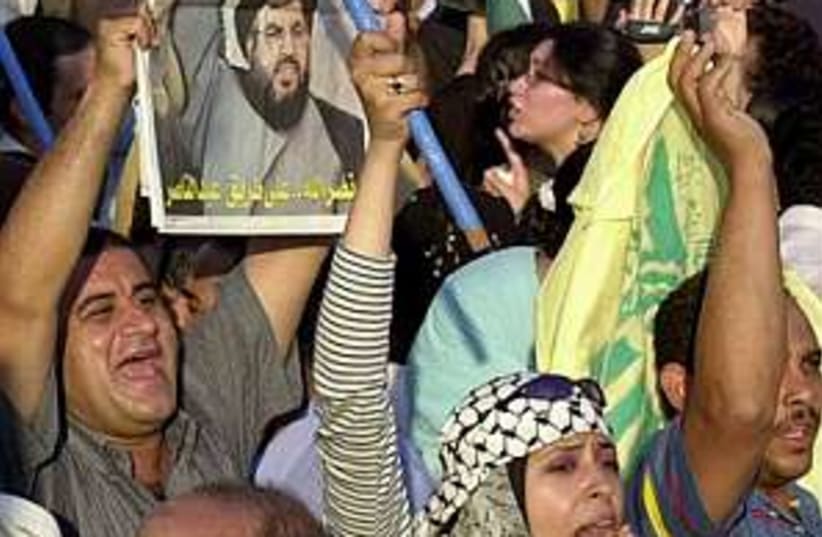Many note that while in 1967 it took the IDF only six days to crush the armies of Egypt, Syria, Jordan and Iraq, the past two decades have proved that Israel is not as strong as it appears or claims to be - at least not in the eyes of its enemies.
Similarly, the ongoing confrontation with the Palestinians in general, and with Hamas in particular, has further shattered the myth of Israel's unlimited power. Scenes of IDF soldiers retreating in the face of Palestinian stone-throwers during the first intifada, which erupted in 1987, marked the beginning of the collapse of this widely-held myth in the Arab world.
Many Arabs continue to argue that that intifada ended in the defeat of Israel, which was forced to sign the Oslo Accords with the PLO and to withdraw from Palestinian cities, villages and refugee camps in the West Bank and the Gaza Strip. Israel's reluctance to use heavy weapons during the first intifada was also interpreted by many Arabs as a sign of weakness.
In May 2000, Israel reinforced the idea that it is running out of steam by the way it withdrew from Lebanon.
That unilateral pullout, where the IDF abandoned hundreds of its long-time allies in the South Lebanese Army, was viewed as a stunning defeat for Israel by the overwhelming majority in the Arab world.
Following the withdrawal from Lebanon, many Palestinians began talking about the need to copy the tactics of Hizbullah - namely suicide bombings, rockets and drive-by shootings - because "this is the only language the Jews understand." Four months later, the second intifada exploded. And as the experience of the past five years has shown, the Palestinians did indeed learn a lot from Hizbullah's tactics.
The unilateral disengagement from the Gaza Strip last year also sent the wrong message to the Arab world. Today, it's hard to find a single Arab who does not see the withdrawal from the Gaza Strip as yet another defeat for Israel.
Ironically, the disengagement undermined the moderates among the Arabs because it sent the message that Israel gives up land only when under attack.
Consequently, any Arab who wants to negotiate with Israel in the future will be ridiculed, because he will be told that the only way to extract concessions from the Jews is by waging war.
One reason Hamas won the parliamentary election in January was because it was credited for driving Israel out of the Gaza Strip with rockets and suicide bombers. Hizbullah's popularity grew after the unilateral withdrawal from Lebanon because the Shi'ite organization, like Hamas, was hailed as the "liberator of Arab lands."
Judging from the reactions on the Arab street, there are still too many young Arabs who sincerely believe that Israel can be eliminated. Throughout the Arab and Islamic world, hatred for Israel is so immense today that, if given the chance, tens of thousands of women and men would join Hamas and Hizbullah almost immediately.
But for now, most of the anger on the Arab street is being directed against corrupt monarchs and presidents, many of whom are seen as obstacles on the road to launching a full-scale war against Israel.
The kidnapping of three IDF soldiers by Hamas and Hizbullah over the past month, as well as reports of heavy IDF casualties in Lebanon, have further boosted the standing of the two Islamist groups among Arabs and Muslims.
Pictures of Israeli soldiers comforting one another after the death of comrades are being shown in the Arab media as yet another indication of Israel's fragility.
Al-Jazeera and other Arab TV stations have also been reporting extensively about the hundreds of thousands of Israelis who have fled their homes in the North because of the Hizbullah rockets. The underlying message of the reports is that the Israeli home front is about to collapse.
On Wednesday, one popular media Web site ran a red banner headline screaming: "Lebanese resistance destroys Israeli army in Bin Jbail." The report was referring to heavy casualties suffered by the IDF during the fighting in the Hizbullah stronghold. As far as many in the Arab world are concerned, the fact that a few hundred militiamen managed to kill so many Israeli soldiers in one battle proves that the myth of Israel's military capabilities is lying deep in the grave.

